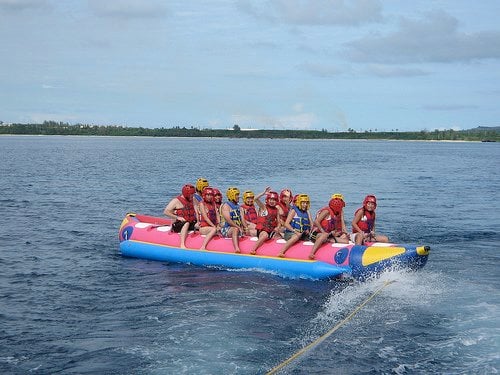As an expat American living away from my home country, it’s sometimes interesting to ask the Japanese people around me what their impressions of us yanks are, to see what stereotypes they might have. “I think they are very ‘about,'” Tomo replied right away, using an imported English word (abauto, アバウト) that has come to mean broad, imprecise, and loose on details in Japanese. (Yes, that fits me to a tee.) He added that while some Americans might hold onto the famous image of the Japanese tourist with a camera around their neck, most of the Americans in Tokyo’s famous Asakusa region fit pretty much the same description, so it all depends on a person’s point of view. Yasu added that the Americans he’s met are extremely friendly, ready to make conversation even though they’ve just met you. “Also, they love ketchup. It seems Americans are always putting ketchup on food.” Um, okay. I’ve been told several times that Americans are optimists, always positive about any subject, and this was an especially important part of the reconstruction of Japan after World War II. This positive attitude is something we are apparently famous for here — I once happened to draw a happy face on a note I was writing, and a Japanese friend of mine saw it and said, “Oh, that’s very American.”
Ah, the smell of kerosene in the morning. Now that it’s starting to get really cold — well, cold from the point of view of this pansy San Diegan, anyway — we’ve broken out the kerosene heaters around here. Because homes and businesses generally lack central heating, the most common method of warming rooms is through stand-alone kerosene heaters called “stoves” (suto-bu, ストーブ), or electric-kerosene heaters that blow heated air (called “fan heaters,” ファンヒーター) and have electronics to control the temperature and shut off after 3 hours (so you can ventilate the room). Kerosene heaters are economical, but they are not without their drawbacks. The smell they make when they start up is bad, but try kicking one accidentally as you walk by it — the safety switch will trigger, shutting off the unit but filling the room with an acrid kerosene stench that’s like being in a paint factory. They seem to leech oxygen from the air, too, making my wife fall asleep on the sofa more often while we’re watching TV together in the winter. There’s a special branch of Murphy’s Law that deals with when the kerosene heaters will run out of fuel, requiring a trip out in the freezing cold to manually refill the tank. The usual place to keep your tanks of kerosene is the genkan, the recessed area of Japanese homes where shoes are removed. Naturally, it’s all to easy to forget to notice that the tank is full and spill kerosene all over the place, soaking the entire family’s shoes and landing me in the doghouse with everyone. Ah, the tribulations of brave gaijin who dare to live in Japan.
My family and I are off for a little vacation to the island of Guam, Where America’s Day Begins ™. We had so much fun when we took the J-List staff there two years ago that we wanted to go back. Guam is sort of a miniature version of Hawaii, with many of the same beautiful beaches and beautiful activities, on a much smaller scale of course (the population is just 170,000, less than our city in Japan). It’s just a short three-hour flight from Japan, and since we cross only one time zone, we won’t spend half our vacation fighting off jet lag. We plan to spend Christmas riding banana boats and jet skis, and getting in some good sea kayaking, too. We know it’ll be crowded with Japanese and Korean and Chinese tourists all around us, but we’ll have fun. All of us at J-List thank you for your support this past year, and wish you all a Merry Christmas, wherever you are in the world! (Since I’ve never known anyone from the mainland U.S. to know much about the place, here’s some reading.)
Remember, we’ve got the perfect answer to your worries about what to give that special someone on your Holiday list, with our handy J-List Gift-Certificates, which can be sent by email for speedy delivery, and which come with a cool PDF gift certificate which can be printed out by your recipient (or you). You’ll be able to rest in the knowledge that your recipient got exactly what they wanted, since J-List has so many cool products from Japan. J-List Gift Certificates never expire, and can be used on both the J-List and JBOX.com websites.
Remember that J-List carries some cool things you just can’t find without hopping on a plane and coming on a plane to Japan. From excellent souvenirs that you could only find in Kyoto gift shops to the legendary high school uniforms (for both girls and guys) from Matsukameya of Nagoya, which J-List distributes exclusively (they don’t speak that much English and were happy to have us handle all their outside-Japan orders). Another cool item we sell are the actual school bags used by high school students in Japan, a totally unique way to carry your stuff to school, or wherever.















